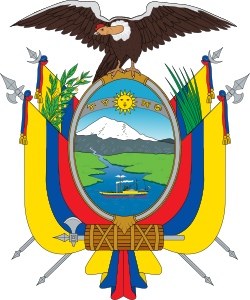 |
|---|
Parliamentary elections were held in Ecuador on 4 June 1986. [1] Only the 59 district members of the House of Representatives were elected. [2] The Democratic Left emerged as the largest party, winning 14 of the 59 seats. [3]
 |
|---|
Parliamentary elections were held in Ecuador on 4 June 1986. [1] Only the 59 district members of the House of Representatives were elected. [2] The Democratic Left emerged as the largest party, winning 14 of the 59 seats. [3]
| Party | Votes | % | Seats | |
|---|---|---|---|---|
| Democratic Left | 349,825 | 14.48 | 14 | |
| Social Christian Party | 304,671 | 12.61 | 12 | |
| Concentration of People's Forces | 228,126 | 9.44 | 6 | |
| Popular Democracy | 226,297 | 9.37 | 4 | |
| Ecuadorian Roldosist Party | 218,319 | 9.04 | 3 | |
| Ecuadorian Radical Liberal Party | 204,336 | 8.46 | 3 | |
| Democratic People's Movement | 176,461 | 7.31 | 3 | |
| Broad Front of the Left | 146,466 | 6.06 | 2 | |
| Alfarista Radical Front | 136,531 | 5.65 | 3 | |
| Democratic Party | 112,337 | 4.65 | 1 | |
| Socialist Party | 106,017 | 4.39 | 6 | |
| Ecuadorian Revolutionary Popular Action | 58,421 | 2.42 | 0 | |
| People, Change, Democracy | 55,446 | 2.30 | 1 | |
| Revolutionary Nationalist Party | 44,841 | 1.86 | 0 | |
| Conservative Party | 33,677 | 1.39 | 1 | |
| Republican National Coalition | 13,621 | 0.56 | 0 | |
| Total | 2,415,392 | 100.00 | 59 | |
| Valid votes | 2,415,392 | 76.69 | ||
| Invalid/blank votes | 734,298 | 23.31 | ||
| Total votes | 3,149,690 | 100.00 | ||
| Registered voters/turnout | 4,255,346 | 74.02 | ||
| Source: Nohlen | ||||